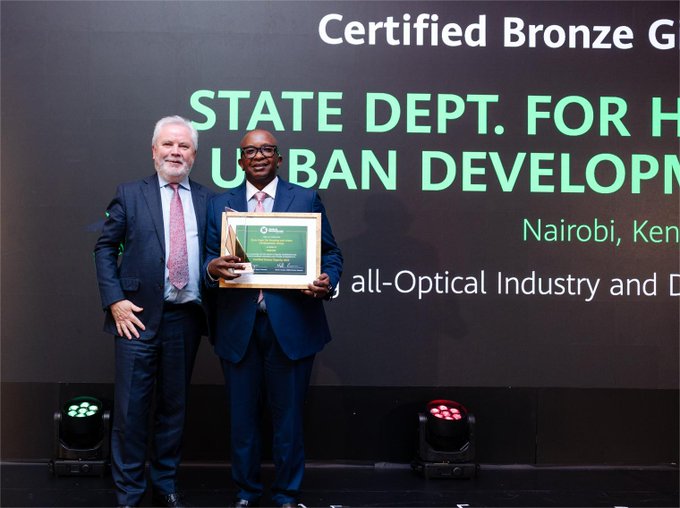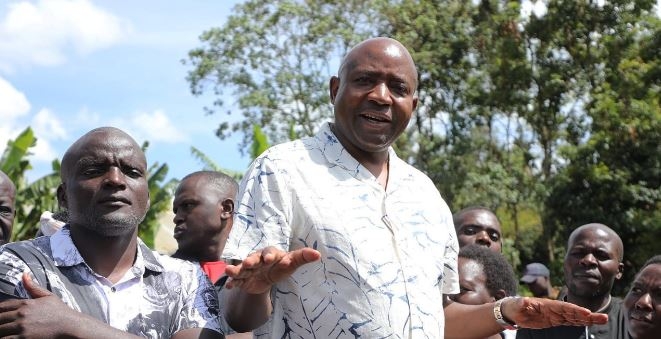
 Housing Principal Secretary Charles Hinga receives the Certified Bronze Gigacity award 2025 for successfully meeting the criteria of Gigacity as established by the World Broadband Association (WBBA) in Cape Town, South Africa./HANDOUT
Housing Principal Secretary Charles Hinga receives the Certified Bronze Gigacity award 2025 for successfully meeting the criteria of Gigacity as established by the World Broadband Association (WBBA) in Cape Town, South Africa./HANDOUT
Kenya’s recognition with the Certified Bronze Gigacity Award 2025 is set to accelerate the country’s drive toward smart, technology-driven urban development, empowering residents, businesses, and local industries across the country.
The award, presented by the World Broadband Association (WBBA) in Cape Town, South Africa, honors Kenya’s innovative approach to integrating gigabit-speed connectivity into housing projects under the Affordable Housing Program (AHP).
Housing Principal Secretary Charles Hinga, who received the award on behalf of the State Department for Housing and Urban Development, said it reflects Kenya’s commitment to creating modern, inclusive, and resilient cities.
“This award is not just a recognition; it is a catalyst for empowering Kenya through smart technologies, high-speed fiber connectivity, and sustainable urban planning,” Hinga said.
He added it it will enhance productivity, improve access to services, and stimulate local businesses, particularly in the youth, women, and Jua Kali sectors.
The Gigacity concept revolves around cities that provide universal gigabit-speed internet to residents and industries, enabling smart technologies, advanced e-services, and digital governance. This connectivity ensures that residents can access online public services efficiently, businesses can operate at high productivity levels, and innovation hubs can thrive.
Kenya is using these principles to transform urban living across the 47 counties, ensuring that urbanisation is inclusive, technology-driven, and sustainable. Kenya’s gigacity projects are already demonstrating the potential of this model. Developments such as Boma Yangu Mukuru Housing Estate and Konza Technopolis, which together include over 2,000 housing units, are being showcased by UN-Habitat and international partners as models of sustainable city-building.
These projects combine energy-efficient buildings, green spaces, rooftop gardens, flood mitigation systems, and mixed-use planning, proving that housing can go hand-in-hand with climate resilience and technological advancement. PS Hinga highlighted the economic benefits of gigacity projects, noting that the initiative is expected to create over 1 million jobs throughout its lifecycle.
The programme engages youth, women, and the Jua Kali sector, providing opportunities in construction, supply of building materials such as cement, steel, doors, and windows, and in innovative services supporting urban infrastructure.
“The Gigacity award strengthens Kenya’s position as a regional leader in urban innovation and provides momentum for replicating smart city principles nationwide,” he said.
Beyond jobs, the gigacity initiative stimulates local industries and drives economic growth. High-speed fiber connectivity allows businesses to leverage digital tools, access new markets, and operate more efficiently. Small and medium enterprises (SMEs) particularly benefit, as they can integrate technology to improve productivity and reduce operational costs.
This integration of technology is also enhancing governance, as residents gain faster access to e-services, including licensing, health records, utility management, and online civic engagement platforms.
The award also highlights Kenya’s commitment to sustainable urban development. Smart cities under the gigacity framework prioritise renewable energy, efficient water and sanitation systems, urban parks, and climate-resilient infrastructure.
These measures not only improve the quality of life for residents but also align with Kenya’s long-term goals for climate adaptation and environmental sustainability. By embedding sustainability, technology, and social equity at every stage, Kenya is setting a benchmark for Africa, showing how urbanisation can drive economic growth, improve quality of life, and build climate-resilient communities.
International partners have praised Kenya’s approach. WBBA Director General Martin Creaner, speaking during the award ceremony, commended the revision of Kenya’s building codes to support gigabit connectivity and smart technologies. He said Kenya’s model demonstrates how governments can leverage digital infrastructure to promote productivity, social inclusion, and urban resilience.
PS Hinga added that the recognition will encourage further investment in technology-driven housing and urban infrastructure, accelerating the adoption of gigacity principles in every county.
“Kenya is not just constructing homes; it is building connected, sustainable, and future-ready cities that benefit all citizens,” he said. The award is also expected to enhance Kenya’s international profile, positioning the country as a hub for smart city innovation in Africa. It is already attracting interest from urban planners, technology firms, and investors eager to participate in Kenya’s ambitious housing and urban development agenda.
















